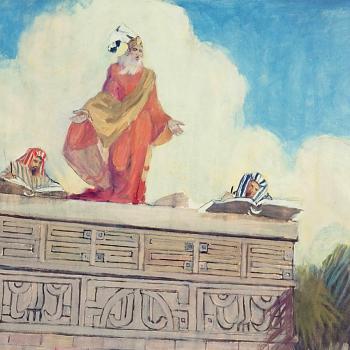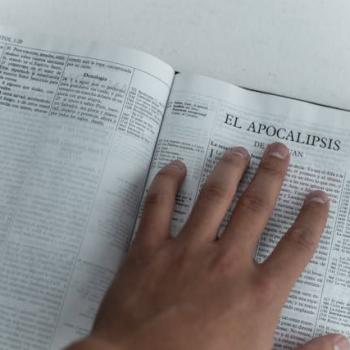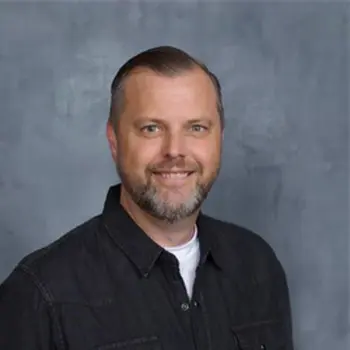Lectionary Reflections
Psalm 23
April 17, 2016
Fourth Sunday of Easter
One would be hard pressed to find too many people who did not know the 23rd Psalm in the King James Version. I am always somewhat astonished at funerals, whether I am performing them or attending them, at the fact that nearly everyone in attendance, including those who have not been inside a church in decades, eagerly and without error, recite this psalm. Is it some sort of holy osmosis, or a kind of virtual churchy inoculation, that puts these very familiar words on the lips of those who have come to honor a friend or a loved one? I just cannot say, but I remain nonplussed all the same.
Knowing the poem is one thing, but actually understanding what it is really saying is something altogether different. On the surface it seems very simple, surely one of its obvious attractions. God is a shepherd, we are God's sheep. God leads us sheep to quiet and restful places, on righteous paths, restores our lives (our "souls" according to the KJV), fills our waiting cups to overflowing, and promises that we will live in God's house forever. Hence, its ubiquitous use at funeral celebrations rests on that summary — rest and peace and eternal life with God. I never fail to hear a quiet but quite audible sigh of relaxation from many of the assembled when we launch into this poem together. Little wonder that no funeral I have either led or attended has failed to recite this psalm.
Given all that reality, I do not at all wish to rain on anyone's funeral parade, nor to snatch from any believer's hand the obvious comfort that this psalm has provided for millions of believers at least since the KJV first appeared in 1611. It is that translation of this psalm and no other that has captured the hearts of worshippers for the past 400 years. Yet, I simply cannot resist some comments on what the Hebrew text of this psalm really says. I fear it is not quite what modern-day funeral goers will be delighted to hear.
In an earlier commentary on this psalm some years ago in this series of lectionary thoughts for Patheos, I told a personal story about my relationship to this psalm when I was charged with the task of translating the Psalms for the 1989 United Methodist Book of Hymns. I and four wonderful colleagues, including the hymnal's editor, met some twenty-two times in places from Los Angeles to London (though when I took the assignment I was assured that "two or three" meetings would suffice!), to attempt an inclusive language translation of all 150 poems, a translation that would read and sing well. If you examine the back of the 1989 UM hymnal, you will immediately note that not all 150 psalms are to be found there and that those that are found are not always complete. This unfortunate fact was the result of a simple lack of space in the book. In fact, I was called just before it went to press and asked to delete eight more psalms, in addition to the ones we had already been forced to excise, to squeeze as many in as possible. It was a most unpleasant experience to watch those psalms hit the cutting room floor!
Nevertheless, before all that process was necessitated, one of the psalms that I was given to examine with special care was Psalm 23. It is a spare Hebrew poem, with a few grammatical difficulties, as most ancient poems contain, but in the main it is readily understandable. The difficulties are found in precisely what these particular Hebrew words mean, and hence what this particular Hebrew poet(s) had in mind when composing the piece. As I noted above, the KJV translators placed their powerful stamp on the meaning four centuries ago, and it is that meaning that has triumphed since. Allow me to offer another possible, and I think more likely, meaning for the poem.
In my reading YHWH is still shepherd, and because that is true, the poet "lacks nothing" (Ps. 23:1). And YHWH still leads the sheep toward "green pastures" and "still waters," and still "restores" the poet's "life." ("Soul" remains an especially poor translation of this common Hebrew word nefesh. The word apparently is based on the idea of "breath," even "throat," so "life" as every human lives it is meant. When the nefesh departs, the person dies. But to imagine this living force as in any way separate from the living body is to make a mistake.) This leading YHWH attempts to keep the poet on the right path, because that is the very essence of YHWH's relationship with all God's human creations (Ps. 23:3).
Whenever the poet finds herself in dark and dangerous places ("the darkest valley," NRSV or "the valley of the shadow of death," KJV) YHWH is always there, using rod and staff for comfort. I readily admit in the times when I have witnessed modern shepherds employ rods and staffs on their flocks, they appear to intend less comfort than discipline. But YHWH's use of rod and staff are designed for comfort when danger threatens. The table preparation in the wilderness "in the presence of my enemies" may be heard in several ways. In my desired reading, I see the banquet spread and enemies invited to partake of the bounty, but I admit that a darker meaning could be seen where the enemies are denied food and drink while the poet eats and drinks her fill. I fear the latter meaning may be the more likely, since at many places in the Psalms the poet asks YHWH to defeat and reject enemies in order that the poet may prosper and triumph. Thus, the overflowing cup is for the poet only; the enemies may starve alone.





